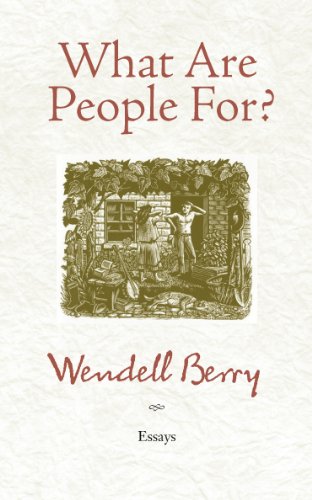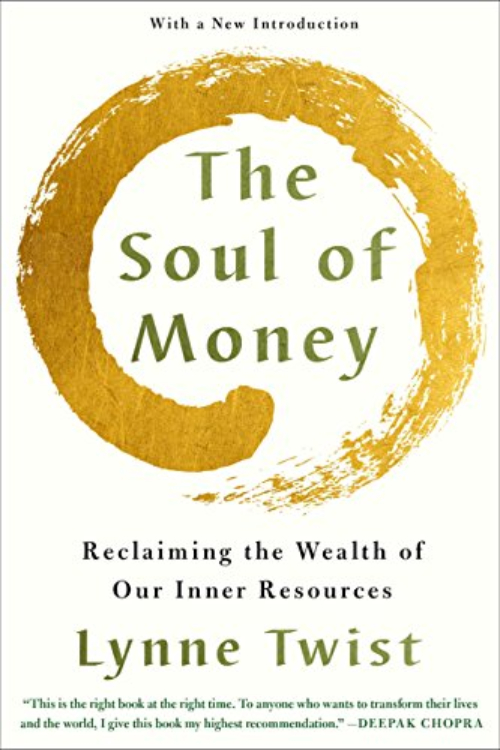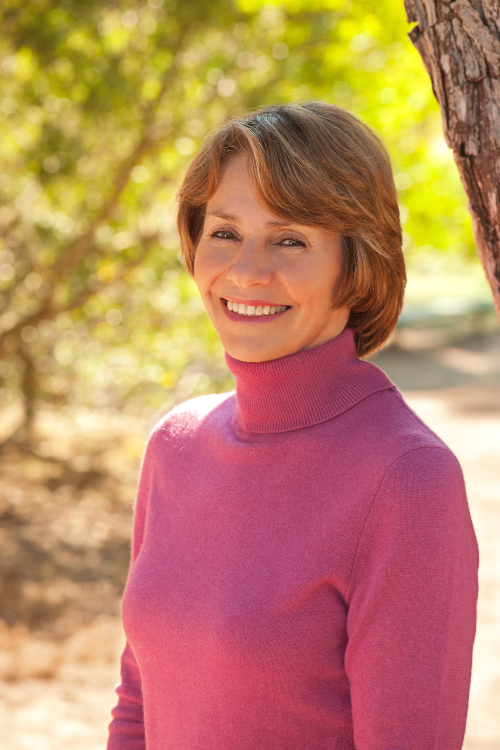#FindYourSacred Book Club has concluded.
Please check back later for upcoming opportunities!
Get Notified About the Next Book Club!
About the Book
The Soul of Money is a wise and inspiring exploration of the connection between money and a fulfilling life. This compelling and fundamentally liberating book shows us that examining our attitudes toward money– how we earn it, spend it, invest it, and give it away–can offer surprising insight into our lives, our values and the essence of prosperity. Lynne shares from her own life and work, a journey illuminated by remarkable encounters with the richest and poorest people on earth, from the famous to the anonymous but unforgettable heroes of everyday life.
About the Author
A global visionary, Lynne Twist is committed to alleviating poverty, ending world hunger, and supporting social justice and environmental sustainability. Through a variety of experiences ranging from working with Mother Teresa in Calcutta to advising some of the world’s wealthiest families on philanthropy, Lynne has gained a deep understanding of people’s relationships with money. She is the author of “The Soul of Money,” co-founder of the Pachamama Alliance, and founder of the Soul of Money Institute.
Book Club Updates
Find Your Sacred Book Club: ‘What Are People For?’
 Welcome to our online repository for the Find Your Sacred Book Club's latest book: "What Are People For?" by Wendell Berry.
Welcome to our online repository for the Find Your Sacred Book Club's latest book: "What Are People For?" by Wendell Berry.
In this book of 22 essays, Berry gracefully navigates from one topic to the next — from insatiable consumerism and household economies to literary subjects and America's attitude toward waste. And he "talks to the reader as one would talk to a next-door neighbor: never preachy, he comes across as someone offering sound advice."
Below are some of the questions we posed along the way, along with a sampling of your thoughtful answers.
*****
1. In the essay Damage, Berry says, "To lose the scar of knowledge is to renew the wound." What sort of scars of knowledge are we tempted to lose? And though the temptation is to forget, how do we benefit from remembering?
Remembering breathes life into the experience which leads to wisdom. —Dana M. Martin
The extreme sadness that comes with the death of someone you love. With that pain comes the acknowledgment of what love means. —Ann VerWiebe
Remembering alters the path we choose and gives courage to offer assistance to others on their journey. One doesn't need to fall into the same pit I did. Can I help shine a light on that steep road? —Kristine B. McAnelly
We are soon to lose the last of the Holcaust survivors. Their direct memory of and witness to that atrocity will be gone. I fear their loss will mean forgetting how one individual can all but destroy an entire faith of people. —Karla Schlensker Sneegas
*****
2. In the essay Healing, Berry says, "True solitude is found in the wild places, where one is without human obligation." Though we currently find ourselves in isolation, it is with extreme obligation. In times like this, how might we find restorative solitude without obligation?
Wild places can be anywhere our boundless, timeless minds create. —Dana M. Martin
I have found that being outdoors, regardless of the weather, for even a few minutes is an intentional space to find that solitude. Creating space in mind and heart to just be is restorative. —Mary Reed Spencer
Cuddling with my pets in the yard. —Rebecca Hoffman
"If protest depended on success, there would be little protest of any durability or significance. History simply affords too little evidence that anyone's individual protest is of any use. Protest that endures, I think, is moved by a hope far more modest than that of public success: namely, the hope of preserving qualities in one's own heart and spirit that would be destroyed by acquiescence."
*****
5. In Style and Grace, Berry explores "A River Runs Through It," a novel in which fishing is described as a rite of companionship. According to Berry: "It is a tragic rite because of our inevitable failure to understand each other; and it is a triumphant rite because we can love completely without understanding." Can you describe any instances in which we love despite a lack of understanding?
*****
6. In discussing the state of Christianity in God and Country, Berry suggests that "organization" can force upon an institution a character that is antithetical to it. Why do you think that's the case? And does it always have to be so? What are some examples of organized institutions that have remained true to their core values or even benefitted from this evolution?
People aren't perfect. Institutions and organizations are created by people and therefore mirror those imperfections. —Dana M. Martin
People are indeed not perfect, so every organization strays over time. The ones that last find ways to renew themselves in dynamic relationship with core values and changing context. I'm not Catholic, but looking at Catholic history it seems to me that the Church has been renewed again and again – mostly by lay led movements. I suspect that professionalization (what Pope Francis calls "clericalism") usually leads to decline. I've long thought the vigor of Baptists (the largest Protestant group in the US), and the remarkable longevity of Judaism could be due, at least in large part, to the way the laity are encouraged to practice their faith – in both traditions with high levels of scriptural literacy, among other things. If this is right, I wonder if people from other, non-Christian traditions, have observed anything similar? —Carol Frances Johnston
*****
Reading Questions: Set 4
Thank you for joining us on this journey of self-exploration into our personal relationships with money. If you have enjoyed this virtual dialogue, we hope you will join us for our concluding conversation on Thursday, September 6th! Please see below for more details.
If you haven’t already, we invite you to review and consider some community guidelines for our virtual book club here
Without further ado, here are our reading questions:
- In what ways has the book helped you to awaken your dreamer within, or re-imagine a world of sufficiency?
- For what do you, and how do you take a stand?
- What surprised you about this book?
Engage in discussion on our #FindYourSacred Book Club Facebook Group. Comment below with any questions or insights! #findyoursacred
Reading Questions: Set 3
We hope you’ve enjoyed reading Part III of The Soul of Money, by Lynne Twist as much as we have! We look forward to continuing the conversation with you.
If you haven’t already, we invite you to review and consider some community guidelines for our virtual book club here
Without further ado, here are our reading questions:
- How does money flow through you? Have you considered where it comes from, where it goes, and if it is meaningful?
- When has allocating your money felt generative and creative?
- Have you experienced prosperity in collaboration? Please share
Engage in discussion on our #FindYourSacred Book Club Facebook Group. Comment below with any questions or insights! #findyoursacred
Reading Questions: Set 2
We hope you’ve enjoyed reading Part II of The Soul of Money, by Lynne Twist as much as we have! We look forward to continuing the conversation with you.
If you haven’t already, we invite you to review and consider some community guidelines for our virtual book club here
Without further ado, here are our reading questions:
- Lynn Twist outlines three toxic myths about money:
-There is not enough.
-More if better.
-That’s just the way it is.
Do you practice any of these toxic myths? How so? - What are some other unexamined assumptions in your life that may inhibit sufficiency?
- What, if anything, in the book has made you uncomfortable?
Engage in discussion on our #FindYourSacred Book Club Facebook Group. Comment below with any questions or insights! #findyoursacred
Reading Questions: Set 1
We hope you’ve enjoyed reading Part I of The Soul of Money, by Lynne Twist as much as we have! We are so excited to share with you our first round of reading questions. Before we get started, we invite you to review and consider some community guidelines here to help facilitate an open, safe, and respectful conversation.
Without further ado, here are our reading questions:
- What is your current relationship with money?
- Is it aligned with your soul? How so?
Engage in discussion on our #FindYourSacred Book Club Facebook Group. Comment below with any questions or insights! #findyoursacred
Welcome to the Find Your Sacred Book Club!
Thanks for joining the inaugural Find Your Sacred Book Club! Join our Facebook group to interact with other Book Club members and answer bi-weekly reading questions. We’ll also post the questions here for those members not on Facebook. Comment below with any questions or insights! #findyoursacred

